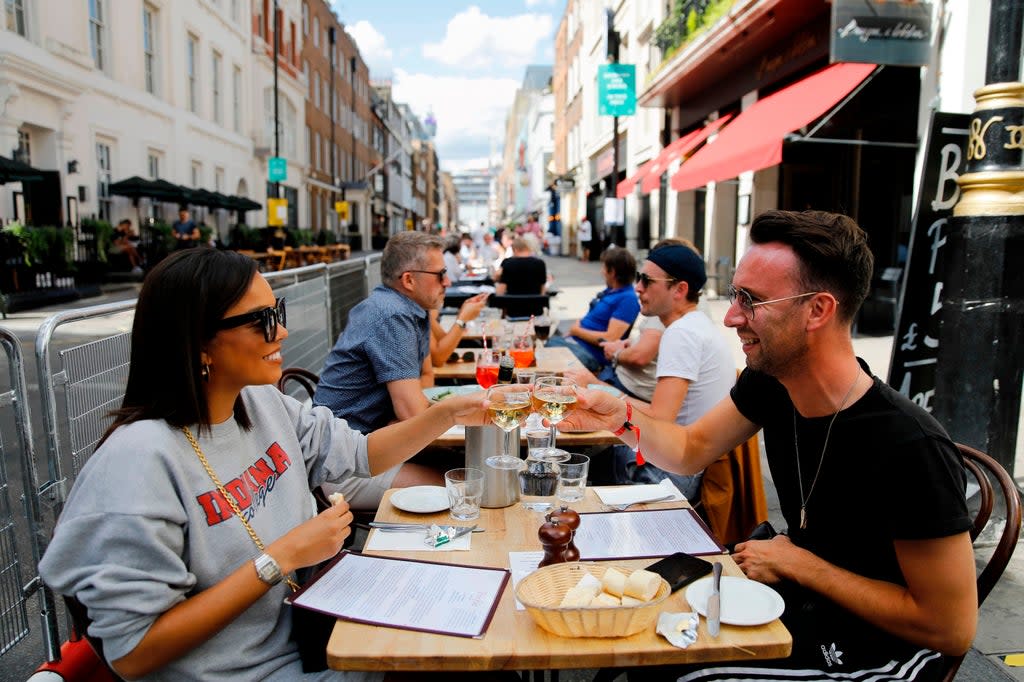Food prices spark record monthly inflation rise as supply problems hit standard of living

A record jump in inflation has triggered fears that millions of households are facing a severe squeeze on living standards.
Inflation soared to its highest level in nearly a decade, according to official data released on Wednesday, increasing to 3.2 per cent in August, partly driven by higher prices for food.
The biggest monthly rise since records began in 1997 takes inflation way above the Bank of England’s 2 per cent target and was higher than the City had predicted.
The jump comes as tax rises loom next April to help pay for the NHS and social care crisis and as ministers press ahead with a plan to scrap the temporary £20 a week uplift to Universal Credit at the end of this month.
“Record inflation is a sign of things to come,” said Yael Selfin, chief economist at KPMG. “While inflation may ease slightly in September, it is expected to remain elevated and could climb higher during subsequent months.
“Recruitment difficulties, cost pressures for businesses, supply chain issues and structural changes post-Covid are all pointing to higher inflation until at least the end of this year.” Although economists said the 1.2 percentage point jump was likely to be a one-off, the Bank of England has already forecast that inflation could hit 4 per cent by the end of the year.
Economists said the increase between July and August was largely down to comparisons with the same period last year when Chancellor Rishi Sunak introduced the Eat Out to Help Out scheme to boost pubs and restaurants battered by the first lockdown.
The record rise was also driven by last year’s temporary VAT cut.
But the Office for National Statistics said food and non-alcoholic drink prices rose by more than last year, helping to push up the rate.
The monthly increase underlines the challenge the Bank faces as it tries to manage the post-Covid recovery.
Last week the ONS announced growth had slowed, with GDP rising by 0.1 per cent, suggesting the boost to national income after the economy reopened earlier in the summer had stalled.
At the same time, job vacancies have risen to a new record of over one million in the past three months, suggesting the economy is being held back as businesses struggle to fill key roles.
Jonathan Athow, Deputy National Statistician for Economic Statistics, said: “August saw the largest rise in annual inflation month on month since the series was introduced almost a quarter of a century ago.
“However, much of this is likely to be temporary as last year restaurant and cafe prices fell substantially due to the Eat out to Help out scheme, while this year prices rose.” Investec economist Sandra Horsfield added that, while the Eat Out to Help Out effect will reverse in September, October’s energy price rises and the tapered end to the VAT reduction will push up inflation.
Amid concerns that families could face food shortages at Christmas, Boris Johnson has appointed Cabinet Office minister Michael Gove to oversee a taskforce to tackle food supply issues.
An exodus of European HGV drivers following Brexit and the pandemic have combined to create a severe shortage of drivers which the Government is trying to address by speeding up the testing system to boost numbers.
But Archie Norman, the chairman of Marks and Spencer, warned this week that keeping supply flows going for Christmas would be a “bumpy ride”.
In a further sign of supply chain woes, the ONS said manufacturers are seeing huge cost rises of raw materials, with both input and output prices rising at the fastest rate for a decade. The concern is that these rises will in time be passed on to consumers,
Bridget Phillipson, Labour’s shadow chief secretary to the Treasury, said: “People are already feeling the effects of inflation, in their weekly shop and at the petrol pump.
“The Government must do all it can to secure the supply chains that keep our economy going, and shouldn’t be hitting families with a devastating cut to Universal Credit and tax rises.”
MPs were on Wednesday due to debate ministers’ decision to end the Universal Credit uplift, introduced to help struggling families during the Covid crisis, with Labour pushing for a vote that could expose Tory divisions on the move.
Read More
Inflation sees largest rise on record after food and eating out costs surge
Inflation jumps to 9 year high as food and petrol costs soar
Supermarket sales continue to fall as cafes take bigger slice of spending

 Yahoo News
Yahoo News 
